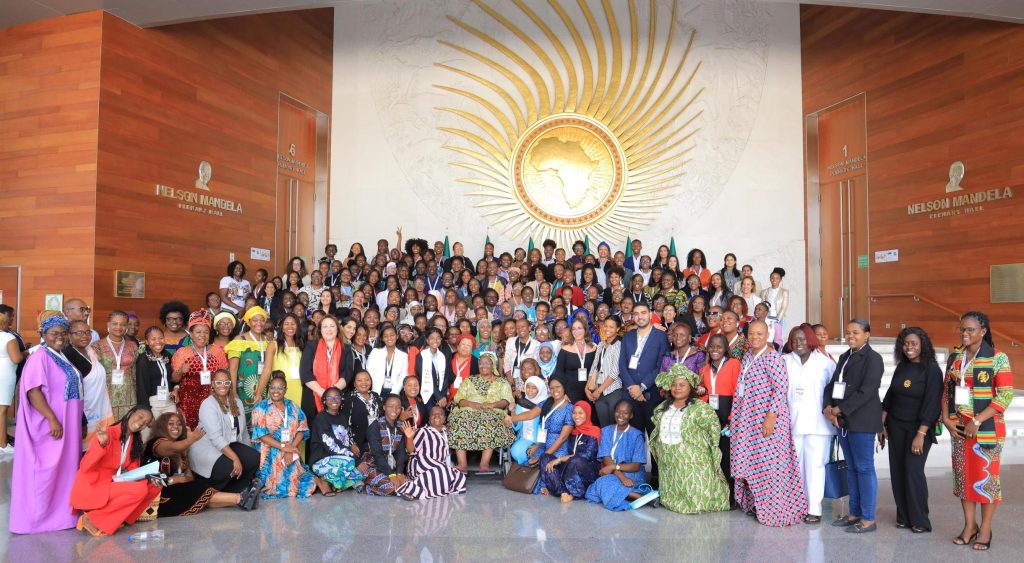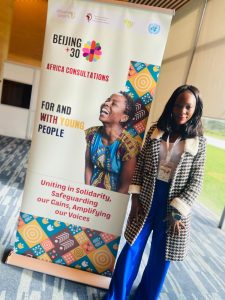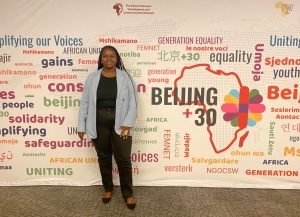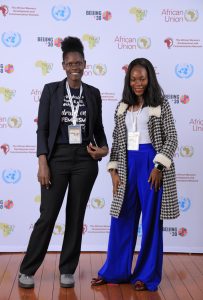Beijing+30 preparations: Achieving gender equality and women empowerment
 16 January 2025
16 January 2025

What an incredible time our Make Way youth representatives and partners had at the Beijing+30 preparation meetings at the end of 2024! We spoke with Agnes Cavillah Namuwonge, Central Region Coordinator at Nexus Youth Initiative (Make Way partner) and Coreen Mwebaze, Make Way Uganda youth representative, who both attended the Beijing+30 Africa youth and CSO consultation. We also chatted with Elizabeth Warindi, Make Way regional and global youth representative, who participated in the sub-regional consultation for Eastern Africa for the Beijing Declaration and Platform for Action. They walk us through the importance of the meetings, the salience of youth representation, the role of intersectionality and their key takeaways.
What is the sub-regional consultation for Eastern Africa and the Beijing+30 Africa youth and CSO consultation?
The meetings are both intergovernmental events aimed at assessing progress, identifying actions and building consensus in achieving gender equality and women’s empowerment – focusing specifically on the African continent. The consultations ensure that no one is left behind in 12 critical areas outlined in the Beijing Declaration and Platform for Action (BPfA). This year, 2025, marks three decades since the global adoption of this significant framework, with the meetings consolidating input for the upcoming 69th session of the Commission on the Status of Women (CSW), which will further appraise the implementation of the BPfA.
What is the importance of youth representation at the meetings?
Agnes
“The Beijing+30 consultation meeting recognises that youth representation is essential for effective policymaking when it comes to sexual and reproductive health and rights (SRHR). Young people are disproportionately affected by issues related to SRHR, which includes access to health care and protection from violence and discrimination. The involvement of young people ensures that SRHR policies are not only inclusive but also address the unique challenges they face while accessing SRHR. Youth participation fosters intergenerational collaboration, strengthening ties between youth and civil society organisations. It ensures that young voices are heard to create more effective and responsive SRHR policies that reflect the needs of all demographics.”

What was your role at the meeting?
Agnes
“My main focus was to provide feedback on the progress of the 12 critical areas of the BPfA implementation in the Ugandan context, particularly what has worked and what progress needs to take place. I also discussed SRHR issues that marginalised youth face, especially those with disabilities, teenage mothers, young people living with HIV and LGBTQI+ persons. I advocated for better and improved policies that are inclusive and intersectional to ensure that no one is left behind.”
Coreen
“My role enhanced the visibility and effectiveness of marginalised youth voices in discussions surrounding SRHR policies. I highlighted achievements such as increased awareness around gender equality and improvements in policy frameworks, while also identifying gaps, particularly regarding access to SRHR services for marginalised youth. Throughout my advocacy, I applied an intersectional lens and called for more intersectional approaches to be used to aid in breaking down barriers to SRHR. Furthermore, I networked with like-minded individuals and civil society organisations (CSOs) to foster partnerships that amplify our advocacy efforts. By engaging in collaborative advocacy and building strategic alliances, we can create a unified voice that demands attention to intersectional SRHR needs, ensuring that no one is left behind in the pursuit of SRHR for all young people.”
Warindi
“The consultation was both a learning moment for me and a pivotal safe space to reflect on the gains and challenges Kenya faces in the implementation of the 12 critical areas that include health, education, and gender-based violence. In the meeting, as a young person, I voiced my concern about the rise of femicide and gender-based violence incidences in Kenya, which the government of Kenya is slow to respond to.”

What role does intersectionality have at the summits?
Agnes
“Intersectionality plays a crucial role at the Beijing+30 consultation as it emphasises the interconnectedness of various forms of discrimination and social inequalities that affect individuals differently, based on their identities such as race, gender, disability, sexual orientation and socioeconomic status. The intersectionality approach is essential in understanding the diverse challenges faced by women and girls across all regions and ensuring that policies are inclusive and equitable. Intersectionality promotes a holistic approach to achieving gender equality by recognising that issues such as health rights, economic empowerment and violence against women and girls are interconnected.”
Coreen
“Intersectionality allows for a deeper analysis of how multiple identities can compound disadvantages. It means that policymakers can develop targeted interventions that address the unique challenges faced by different groups. Inclusion of intersectionality in the discussions at the Beijing+30 consultations ensures that in gender equality conversations, the voices of the most marginalised people are elevated and heard.”
Warindi
“The summit aims to review progress made over the past 30 years while advocating for policies that are inclusive and responsive to these complexities. By integrating intersectionality into discussions, participants can ensure that marginalised voices are prioritised in policymaking processes. Emphasising intersectionality seeks to foster a more equitable landscape where all women and girls can thrive, ensuring that no one is left behind in the pursuit of gender equality and empowerment. This focus on unique barriers faced by various groups aims to galvanise political will and resources necessary for achieving meaningful change in global gender equality initiatives.”
What were your key takeaways?
Coreen
“During the consultations, I learnt about the urgent need for increased advocacy for intersectionality in addressing gender equality issues. Understanding diverse and overlapping identities of individuals is essential for effective policymaking and advocacy. However, we also observed rising opposition that hindered our ability to advance our views and recommendations. The consultations not only deepened my understanding but also inspired me to continue advocating for inclusive policies that reflect the needs of all individuals.”
Warindi
“The sub-regional consultation provided a platform to network with other key civil society organisations such as Akina Mama wa Afrika, FEMNET and UN Women Africa. I had a chance to learn from seasoned pan-African feminists on resilience, which is now especially timely with slow progress towards gender equality and shrinking civil society space.”

Is there anything else that you would like to share?
Agnes
“There is a need for reduction or even removal of restrictions on youth advocates, activists and youth led organisations to attend spaces, for example the CSW. Many young leaders who have been participating in the Beijing+30 consultations may not make it to the CSW because of the ECOSOC accreditation requirement for one to apply. This will limit youth representation at the conference hence leaving out their specific needs.”
Coreen
“While there were valuable insights shared, I noticed a concerning lack of representation for minority youth, particularly LGBTQI individuals, youth with disabilities and youth from rural settings. This absence highlights the ongoing challenges we face in ensuring that all voices are heard and that policies reflect the diverse experiences of young people.”
Warindi
“The visa policy and associated costs significantly limit young people’s ability, especially marginalised youth, to attend these sessions. The complexities of the application process and the need for supporting documentation further discourage participation. This situation underscores the need to create more accessible and affordable visa policies, enabling all young people, especially from underrepresented backgrounds, to engage in important discussions and decision-making processes at these conferences.”



